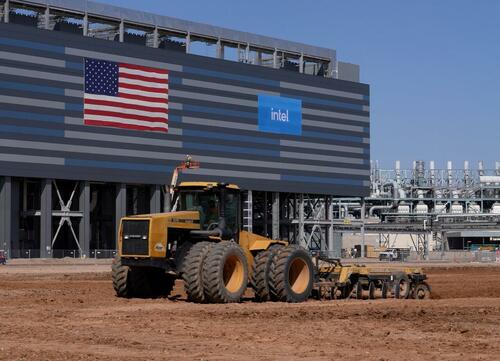Chip Makers Stall On Building New Semiconductor Plants As Subsidies Bill Languishes
The Biden administration is laser-focused on sending Ukraine billions of dollars in weapons, including the latest round of anti-ship systems, artillery rockets, and rounds of 105 mm ammo for howitzer cannons that it has entirely lost focus on reshoring efforts to boost semiconductor production Stateside.
Multiple manufacturers of semiconductor wafers have announced plans for new multi-billion dollar factories across the U.S. but are contingent on Congress allocating funds to aid in building facilities under the Creating Helpful Incentives to Produce Semiconductors (CHIPS) for America Act.
Congress passed the CHIPS Act in January 2021 as part of last year’s National Defense Authorization Act, which proposed $52 billion in funding for increasing the domestic capacity of chip production, though the House and Senate have come to a standstill over disagreements on certain parts of the bill that have sparked so much uncertainty among companies set to build new factories.
In a letter on June 15, dozens of technology executives from IBM, Intel, Microsoft, Analog Devices, Micron, Amazon, and Alphabet called on Congress to move quickly on the CHIPS Act. They wrote, “the rest of the world is not waiting for the U.S. to act,” and funding for new chip factories must be achieved immediately.
The uncertainty around Congress not formally allocating any budget to finance the CHIPS Act is causing concern among top chipmakers planning to build massive factories that might have to delay expansion plans.
“Unfortunately, CHIPS Act funding has moved more slowly than we expected, and we still don’t know when it will get done. It is time for Congress to act so we can move forward at the speed and scale we have long envisioned for Ohio and our other projects to help restore U.S. semiconductor manufacturing leadership and build a more resilient semiconductor supply chain,” an Intel spokesperson recently said in a statement.
Taiwan’s GlobalWafers announced a new $5 billion factory in the U.S. on Monday, but contingent on subsidies from the federal government.
“This investment that they’re making is contingent upon Congress passing the CHIPS Act. The [GlobalWafers] CEO told me that herself, and they reiterated that today,” U.S. Commerce Secretary Gina Raimondo told CNBC, the same day GlobalWafers announced its development plan.
In 2020, Taiwan Semiconductor Manufacturing Corp. announced a new $12 billion plant in Phoenix, Arizona, and said some of the building costs would have to be picked up by the U.S. and Taiwan.
The Biden administration has hailed the president’s efforts to increase chip manufacturing capacity, but Congress appears to be holding things up, which may result in delays for planned expansion projects this fall.
Currently, the U.S. only accounts for 12% of the world’s chip supplies, a 40% reduction since the 1990s. The CHIPS Act is supposed to restore America’s dominance in chipmaking — but expansion plans appear to be on hold as funding Ukraine seems to be the top priority in Washington.
Tyler Durden
Thu, 06/30/2022 – 20:10
via ZeroHedge News https://ift.tt/Ryjzfb1 Tyler Durden
